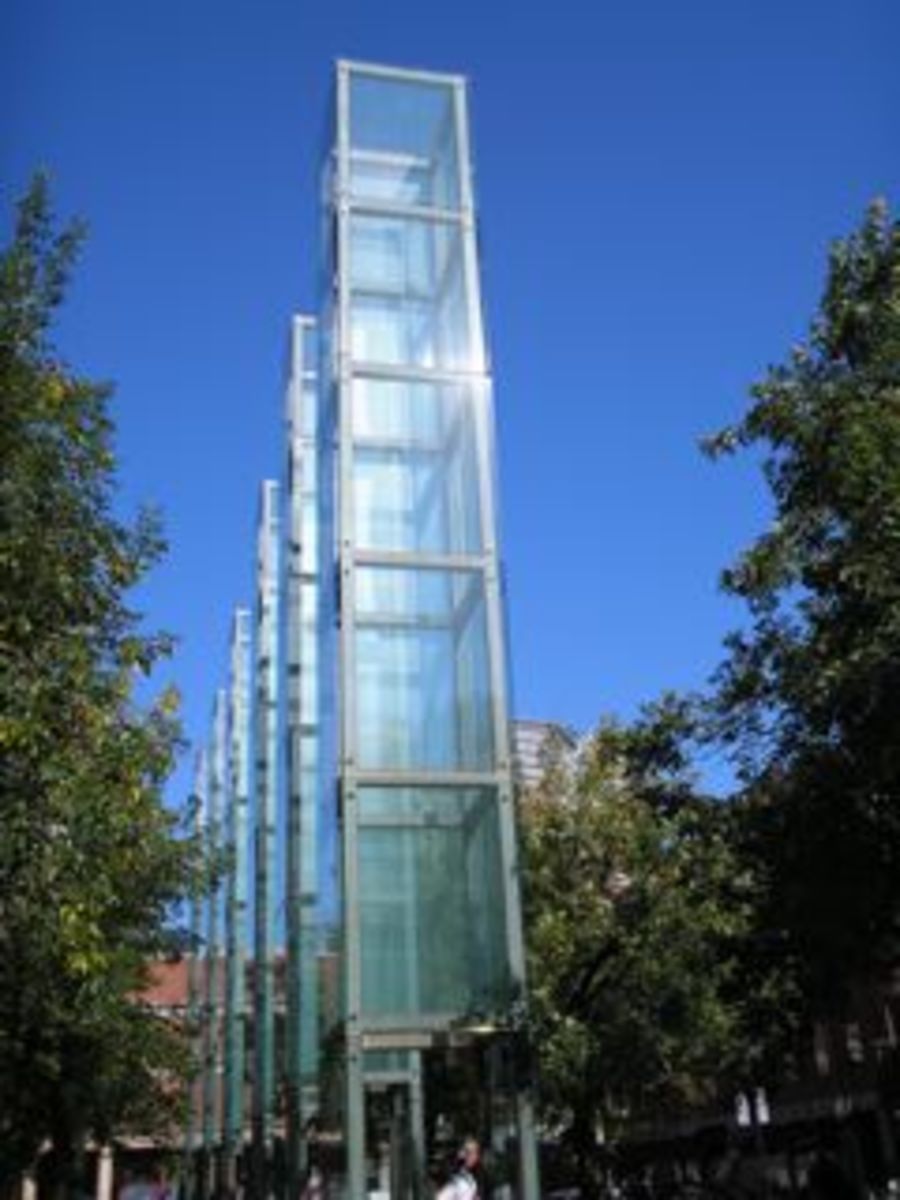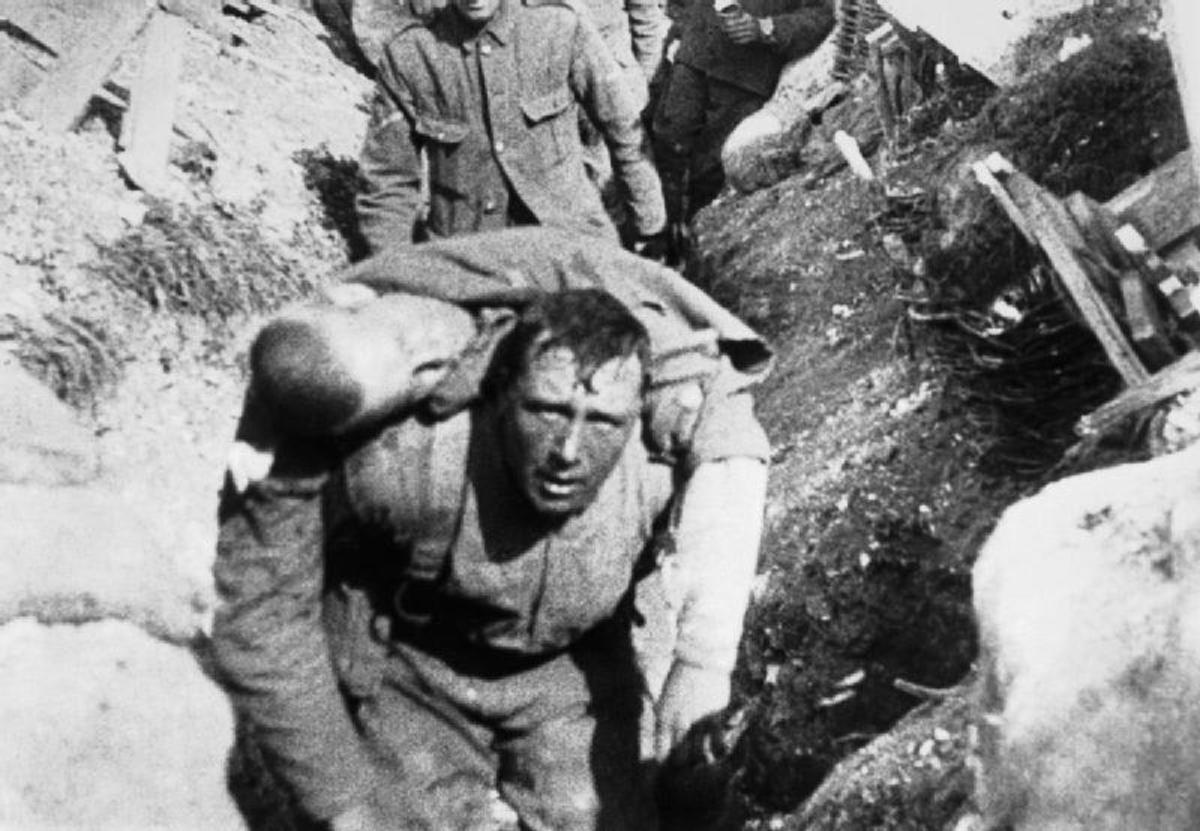- HubPages»
- Education and Science»
- History & Archaeology»
- History of the Modern Era
Get Your Way and Influence People to Speak Hebrew by Being Incredibly Stubborn - Eliezer Ben-Yehuda
Portrait of Eliezer Ben-Yehuda
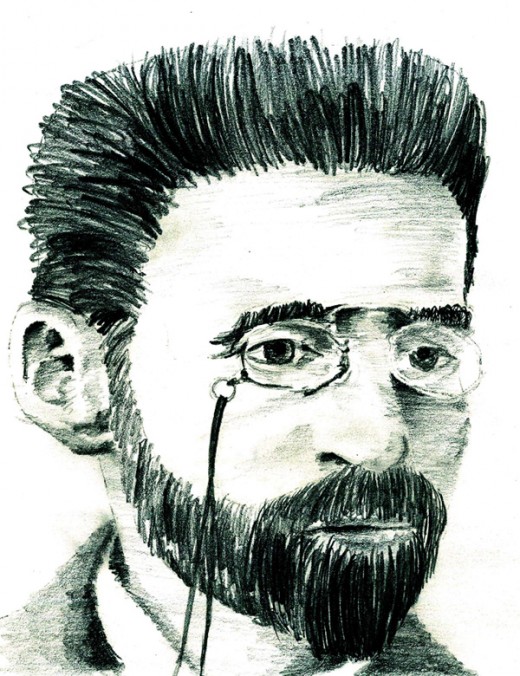
How to influence a nation
Hebrew today is a living language; a century ago it was dead; used mainly for studying and discussing the Old Testament. One man, Eliezer Ben-Yehuda, led the movement to make Hebrew the language of Israel. He must have been a very persuasive man, really good at winning friends and influencing people. Right? Not exactly. He just didn't know when to quit. And he failed to die of tuberculosis as expected. And he ignored public opinion and raised his firstborn as the first modern child to grow up speaking only Hebrew. And when his wife caught his tuberculosis and died, he married her sister and went on to have a total of 11 children between the two of them.
He became the voice of a movement that said if the Jews were to be a people, they needed their own land and their own language. And now Israel speaks Hebrew - again.
Ben-Yehuda was supposed to die but wrote a Hebrew dictionary instead
Here's the quick version of interesting events in Eliezer Ben-Yehuda's life: his language teacher fell in love with him, and he eventually married her, though he hesitated because he had tuberculosis and expected to soon leave her a widow. They moved to Israel (Palestine, at the time) and he had had five children with her. The first was not to hear any language but Hebrew even in the womb - even while his wife was in labor! Not surprisingly, the boy was considered different by other children and was picked on while growing up.
Ben-Yehuda did not leave his wife a widow. She caught his tuberculosis and died, leaving him a widower, and shortly afterward three of the children died of malaria. But, following his late wife’s wishes, Ben-Yehuda married his wife's little sister who had wanted to marry him since she was five, and he had six more children with her. As his first-born son was his visual aid for how to raise a Hebrew-speaking child, his second wife was the visual aid for how fast an adult could learn Hebrew.
He was the editor of a newspaper with a quiet, gentle name (The Deer) - completely unsuited to his temperament, and used it to teach Jews returning to Israel words for things like "airplane" or "tomato". He singlehandedly wrote a dictionary of modern Hebrew despite claiming (apparently quite accurately) that he was the wrong sort of person for the job.
So was he a brilliant man or a wife and child abuser? In the end his life was one tremendous language experiment – can an old language live again – and it worked. Let's take a more detailed look at how it all happened.
Non-Biblical Word: Tomato
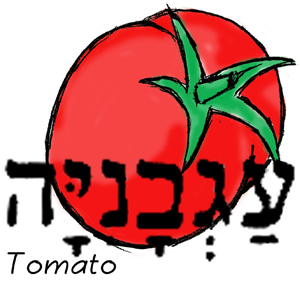
The Beginning of a Dream
Eliezer Ben-Yehuda grew up in Lithuania in the last half of the 1800s as Eliezer Yizhak Perelman, speaking Yiddish and learning Hebrew only as the holy language to read and discuss the Jewish Scriptures. Though his own family was too poor to give him the education he had the talent for, a richer uncle helped out and he stayed in his uncle's house.
When he became a man at thirteen, his uncle said he was now on his own; that the work of supporting himself would help him in becoming a great rabbi. Perhaps it did help him in the determination he showed in his later life, but his uncle probably regretted it. Eliezer came under the influence of some rabbis who thought there were other things worth studying besides the Torah, and that Hebrew could be used to talk about things other than the Holy Scriptures. That was a radical idea because it meant debasing the language used for talking about holy things; using the language to describe everyday, ordinary things, besides garbage and even less mentionable things.
Eliezer's uncle came and took him away from these dangerous influences, but Eliezer would not stop reading books like Robinson Crusoe written in Hebrew. If his uncle could not make him stop, at least he could keep such things from going on under his own roof. So he threw Eliezer out.
One people, one land, one language - why not Hebrew?
Eliezer ended up in another town, taken in by a family who also liked the new ideas he'd been learning about. He stopped thinking of himself as a traditional Jew and quit dressing in the traditional way. The family's oldest daughter became his Russian and German teacher for two years. But when she had taught him what she knew, she didn't want him to leave - at least not to leave her. He promised her in Hebrew, the language for binding promises, that he would not forget her, and at sixteen, he went off, with a nagging cough, to an advanced school for Russian boys.
At the Russian school, he got caught up in Russian nationalism and rejected almost everything Jewish, but a love for the Hebrew language kept him from completely becoming one of the narodniki.
He had just turned twenty when an inspiration flashed upon him; why couldn't there be Jewish nationalism?
But something would be needed to connect Jews scattered all over. Hebrew was not spoken even by all Jews at the time. When it was, it was usually spoken for religious or legal reasons, or sometimes to communicate (with difficulty, due to different accents) with Jews from somewhere else. It was used for writing (much as Latin had been in Europe for centuries), and Jewish children were taught to read and write it. For everyday subjects, Jews used other languages, especially Yiddish (a mixture of German and Hebrew) in Europe and Ladino (a mixture of Spanish and Hebrew) in many other parts of the world. Or they might just speak the language of the country they lived in.
Like Latin, Hebrew was being used less and less by everybody but scholars. The world and industry were changing and the language didn't have words for the new things.
But Hebrew was the closest thing there was to a language all Jews spoke; why waste that, along with centuries' worth of tradition behind words in the language? Maybe it could be updated somehow. Eliezer started to flesh out his ideas, and he moved to Paris, where he found other Jews with similar ideas about the need for Jewish identity.
But he also found he had tuberculosis.
Non-Biblical word: submarine
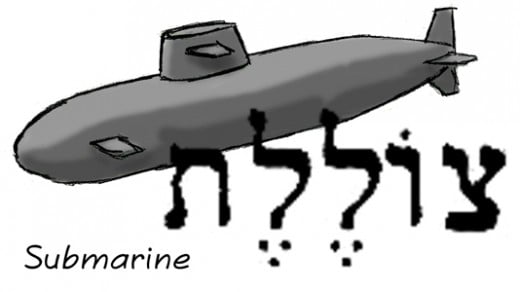
The start of his mission in life and of his family
Eliezer was supposed to have only a short time left to live. But he had this new dream, and with so little time to accomplish it, obviously he would have to work hard and fast. In all the busyness, it seems he forgot to die. He decided that as the Jewish people needed a land, they needed a language, and the land and language needed each other. On the one hand, if Jews were to come from all over the world to Israel, they would need one language to communicate in. On the other hand, if they tried to revive Hebrew while surrounded by other languages, they would never succeed. The needs for land and language were inseparable.
He changed his last name to Ben-Yehuda - "son of Judea".
About this time he went to Algiers, and for the first time in his life had to speak Hebrew for communication. The pronunciation was a bit different, though, and for everyday communication, there were just a lot of words that didn't exist anymore. So he started collecting words, and sometimes coining his own, creating a list of Hebrew words to describe everyday things.
Meanwhile, he found out his former teacher, Deborah, wanted to marry him, tuberculosis or no tuberculosis. So he did, against the advice of family who felt they were not being practical. He was 23 and she was 27. After the wedding, he announced that they would only speak Hebrew from then on. It can't have been a huge surprise to Deborah, but it became a lot of effort for her, and it cut her off from friends who didn't know Hebrew well. Then again, could the Ben-Yehudas have friends who didn't want to learn Hebrew?
Shortly after being married, they went to Israel, or Palestine as it was called then.
Hebrew (only) spoken here!
The new Mr. and Mrs. Ben-Yehuda weren't very impressed with their first sight of the ancient land of Israel. But they were excited to find Hebrew being spoken, and in fact it had never completely died out in Jerusalem, because there of all places it was needed for Jews from everywhere to communicate. So Eliezer listened for new Hebrew words, and wrote down more new vocabulary. He got a job teaching, though he insisted on the condition that he would teach his classes only in Hebrew.
Ben-Yehuda was both popular and unpopular in Palestine. Orthodox Jews there felt that Ben-Yehuda was misusing the holy language. But more and more Jews (some extremely un-orthodox) were coming to the Holy Land especially from Europe, escaping anti-Semitic persecution. Many of these Jews liked Ben-Yehuda's ideas, had similar ones of their own, and were becoming the Zionist movement. One settlement of such new arrivals called Rishon Le Zion, "first in Zion", called Ben-Yehuda its father and agreed to speak only Hebrew.
About this time, he also became a father in a more usual way (and reminded his wife between labor pains to speak only Hebrew lest the child hear a foreign language), and named his son Ben Zion "son of Zion".
Ben Zion spoke late (not too surprising for a child brought up by parents speaking what to them was a foreign language, and one lacking in daily vocabulary.) But eventually he spoke Hebrew well. Ben Zion seems to have grown up lonely. It was almost like being a child in a foreign country who can't communicate with others at school, but in his case, it was Ben Zion speaking the native language, and everyone else spoke something else! On one especially hard day, some other children heard him speaking Hebrew to his dog, said he was speaking the holy language to a dog, and ended up killing the dog.
It all sounds like what would today get called child abuse. Was it? Well, when he grew up, he changed his name - to Ittamar (which was his parents' original choice for his name) Ben-Avi (which means "son of the father"). He followed in his father's footsteps as an ardent Zionist. Clearly, Ben Zion experienced abuse, and clearly he didn't think the abuse came from his father!
In an interesting role reversal, here is an article I found about what it's like to grow up speaking Hebrew and suddenly be immersed in English. That could not have happened very many decades before it did!
Eliezer Ben-Yehuda - unreasonable or merely mad?
Which quote describes Eliezer Ben-Yehuda best?
Non-Biblical word: penguin
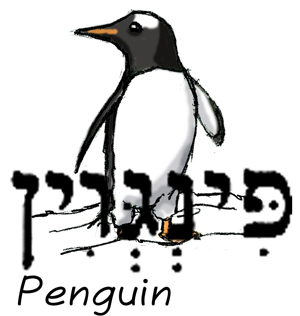
Ha-Zvi, a fiery, passionate deer
Eliezer took over a newspaper called Ha-Zvi, "The Deer". He didn't like that being the name but due to legal restrictions couldn't change it. So he had to prove himself that his intentions were not gentle or quiet.
The paper spread news, and also Hebrew vocabulary. But it wasn't presented as a vocabulary lesson. Ben-Yehuda listened for new Hebrew words, and sometimes coined them himself (such as a word for "elevator" from a line in the prayer book about "go up and come down"), and introduced new words by using them in each issue.
Along with the non-traditional use of the language were more of his non-traditional ideas, so the paper didn't exactly increase his popularity in the Orthodox community.
Important Places in Ben-Yehuda's life
Eliezer Ben-Yehuda was born, grew up, and met his wives in the area of Lithuania.
Ben-Yehuda had to use Hebrew to communicate for the first time in Algiers, and experienced the Sephardic (as opposed to Ashkenazic) accent here.
Eliezer Ben-Yehuda spent most of his life and did most of his work in Jerusalem.
Sister bequeaths husband to sister
Publishing a newspaper did not bring in much money, and Deborah also took a job teaching, as well as being a mother to their five children. When she caught tuberculosis she soon died of it, perhaps lacking Eliezer's passionate will to live and accomplish his mission. Before she died, she asked Eliezer to marry her little sister. She also wrote to her little sister, Pola, about the idea.
It didn't happen immediately, but Pola eventually wrote to Eliezer saying she was thinking of changing her name to a Hebrew name and wanted suggestions. From the list he sent back, she picked Hemda, "joy and beauty", and told him so. He wrote to her saying that she should indeed change her name to Hemda, and he also suggested changing her last name, to Ben-Yehuda.
She thought it was an excellent suggestion...but her parents, among others, didn't like the idea (maybe not wanting another daughter to die of the tuberculosis Eliezer failed to die of.) Eliezer, for once, listened to public opinion, and decided he should not do this to her. He took back his proposal.
Hemda, however, disagreed with his disagreement, and announced that she intended to fulfill her sister's last wish. So they married and she came to Jerusalem to be a mother to her nephew and niece. There was a slight problem though - Hemda Ben-Yehuda barely knew Hebrew.
Like any other Ben-Yehuda, naturally she would just have to learn it, and fast. In six months she could have a conversation on the street, and she became another exhibit for him to show off. People couldn't talk to Hemda and say, it's easy for children to learn a new language, but as an adult, I can't learn. So Hemda went places with Eliezer, speaking through an interpreter to women who only spoke Yiddish. Of course, she could have spoken Yiddish to anyone. But this way the other women ended up trying to speak Hebrew themselves during the conversation.
Non-Biblical word: rocket
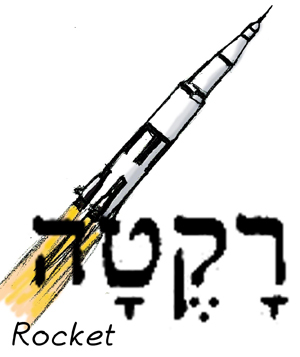
A dictionary author who laughed at language science
Hemda started writing women's interest articles for Ha-Zvi, and started on the six children she would bear to Eliezer. Meanwhile, Eliezer was starting on his dictionary project, since a dictionary was needed and nobody else was writing one.
But words landed him in prison, as an article by his father-in-law, writing about the Maccabees in Ha-Zvi, used a phrase to mean "move forward" that got interpreted as "to form an army" which concerned the Turkish authorities. As editor, Ben-Yehuda ended up in jail for eight days, and wasn't allowed to publish his paper until the trial was over. (Or, actually, as it turned out, until the judge was bribed by French millionaire Baron Edmond de Rothschild, to keep Ben-Yehuda from returning to jail.) But he still couldn't publish the paper for four months, which left him with nothing to do but...write a dictionary.
In an ironic quote for the man known as the Father of Modern Hebrew, he said,
"I must admit that for the work of a real dictionary of the Hebrew language I was not in the least prepared, not with respect to my knowledge of the science of language, and not with respect to my temperament. And more than this: according to the spirit which prevailed among the youth in Russia at that time, the science of language, Philologie, was a little simple-minded in my estimation, and I made fun of it. The study of language was not a subject I enjoyed, and I had absolutely no desire to become involved in it."
--Malka Drucker, Eliezer Ben-Yehuda: The Father of Modern Hebrew, (New York: Lodestar Books, 1987), 58-59
He coined many new words, including the word for "dictionary". In 1897 he published a forty-page dictionary, and it sold right away. But that was just a taste; his real work was his 100,000-word dictionary, containing more than 10 times as many words as were in the Torah; it was also something of an encyclopedia, thesaurus and Jewish history book.
Hebrew and Education
Hebrew was being used more and more in Palestine, but in some ways it still wasn't taken seriously. Ben-Yehuda sent his son Ben Zion to a university in Paris to show that a Hebrew-educated child could know enough to attend a respected university. It was there that he changed his name to Ittamar Ben-Avi, and he continued to help his father in his efforts.
Many German-speaking Jews felt that German was the language of science, and when they financed the first college in Palestine, they assumed courses would be taught in German. But all over Palestine children were now being taught in Hebrew, and this was one reason more and more Hebrew was being spoken in homes. So the university's teachers announced that unless Hebrew was the language of the classes, they wouldn't teach. The protest was so great, it was later called the War of Language. The board of the college was finally convinced enough to decide on February 22, 1914, to teach math and physics in Hebrew and to give other subjects a grace period of four years to learn or create a suitable Hebrew vocabulary.
It was a turning point in Hebrew becoming the national language.
Hebrew today - Ben-Yehuda lived to see his dream come true
By this time, over forty years 34,000 people had come to know Hebrew as their first or only language. Not really a very impressive number, maybe the size of one small city, until you consider what it takes to convince people to change the language spoken in their home.
Ben-Yehuda spent part of World War I in the United States, because the Turks considered him an "enemy national", but he was able to return in 1919.
On November 2, 1917, the Balfour Declaration declared Palestine to be, in the view of the British government, a national home for the Jewish people.
Eliezer had written 5 volumes of his dictionary, and knowing his end was near, made notes and plans for the rest of it. (It was finished by Hemda and his son Ehud in 1959, with 16 volumes.) He died in 1922 while trying to write an appeal to Jews all over the world to think of Palestine as their homeland. A month before he died, Hebrew had been declared by the British mandate to be the official language of the Jewish community in Palestine, and in 1948 Israel was declared an independent state.
So did Eliezer Ben-Yehuda influence people? Many words he coined are used today, but also many are not. (Some just never "took".) There were many other factors that led to Hebrew becoming the national language of Israel. But Eliezer was the spokesman and the visionary. This man many in his lifetime must have considered a crackpot is now a national hero. Today novels written in Hebrew get translated into other languages, and Hebrew has enough international interest that today, out of 6500 languages in the world, it is one of 30 languages offered by the popular language course Rosetta Stone. (Biblical Hebrew, last I checked, is not offered, because you learn living languages in a different way from a language where all the words are written and not changing.) And as for the influence on his family, his grandson has a website to "raise Hebrew literacy around the world".
Did he win friends? Maybe. Did he influence people? All over the world!
More about Hebrew
- Website for learning Hebrew
Hebrew 4 Christians website for learning Hebrew. Also has several pages of Jewish humor. - Internet classes in Biblical Hebrew
Learn Biblical Hebrew with eTeacher and the Hebrew University of Jerusalem







